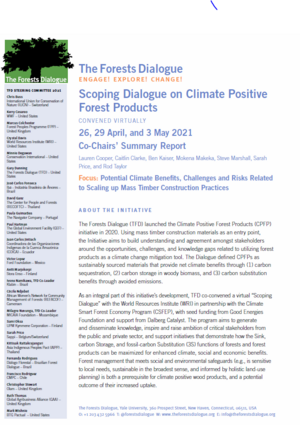Co-Chairs’ Summary: Scoping Dialogue on Climate Positive Forest Products
The Forests Dialogue (TFD) launched the Climate Positive Forest Products (CPFP) initiative in 2020. Using mass timber construction materials as an entry point, the Initiative aims to build understanding and agreement amongst stakeholders around the opportunities, challenges, and knowledge gaps related to utilizing forest products as a climate change mitigation tool. The Dialogue defined CPFPs as sustainably sourced materials that provide net climate benefits through (1) carbon sequestration, (2) carbon storage in woody biomass, and (3) carbon substitution benefits through avoided emissions.
As an integral part of this initiative’s development, TFD co-convened a virtual “Scoping Dialogue” with the World Resources Institute (WRI) in partnership with the Climate Smart Forest Economy Program (CSFEP), which includes the World Economic Forum (WEF), Climate KIC, and The Nature Conservancy (TNC), with seed funding from Good Energies Foundation and support from Dalberg Catalyst. The program aims to generate and disseminate knowledge, inspire and raise ambition of critical stakeholders from the public and private sector, and support initiatives that demonstrate how the Sink, carbon Storage, and fossil-carbon Substitution (3S) functions of forests and forest products can be maximized for enhanced climate, social and economic benefits. Forest management that meets social and environmental safeguards (e.g., is sensitive to local needs, sustainable in the broadest sense, and informed by holistic land-use planning) is both a prerequisite for climate positive wood products, and a potential outcome of their increased uptake.

